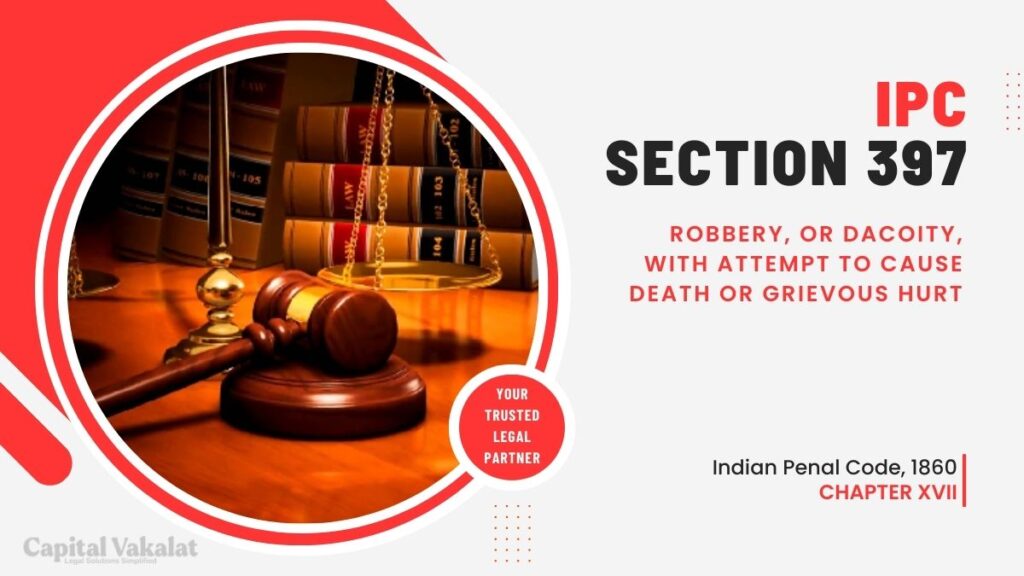Robbery and dacoity are serious offenses under Indian Penal Code (IPC), but when combined with an attempt to cause death or grievous hurt, the gravity of the crime reaches a new level.

Section 397 IPC addresses such situations, outlining the legal consequences for individuals involved in acts of robbery or dacoity with an attempt to cause serious harm.
Introduction to Section 397 IPC
In the vast realm of criminal law, Section 397 IPC holds a distinctive position. It specifically deals with cases where robbery or dacoity is accompanied by an intent to cause death or grievous hurt. Understanding the nuances of this section is crucial for legal practitioners, scholars, and the general public.
Definition of Robbery and Dacoity
Before delving into Section 397 IPC, it’s essential to comprehend the basic concepts of robbery and dacoity. Robbery involves the use of force or threat to snatch someone’s property, while dacoity is a more organized form of robbery committed by a group of individuals. Both offenses involve a violation of personal security and property rights.
Attempt to Cause Death or Grievous Hurt
What sets Section 397 IPC apart is the additional element of attempting to cause death or grievous hurt. This escalates the severity of the crime, recognizing the potential lethal consequences of the perpetrator’s actions. The law acknowledges the intent to inflict severe harm or even death, making it a matter of utmost concern.
Section 397 IPC: Detailed Analysis
To gain a comprehensive understanding of Section 397 IPC, it’s crucial to dissect its language. The section explicitly outlines the elements that constitute the offense, and a closer look at its wording can provide insights into its application. Real-life case studies further illustrate how this section is invoked in different scenarios.
Punishments and Penalties
The penalties associated with Section 397 IPC are severe, reflecting the gravity of the offenses it addresses. Offenders may face imprisonment and fines, and the legal consequences are designed to serve as a deterrent. Exploring these penalties helps in appreciating the significance of adhering to the law.
Legal Defenses
While the law is stringent, there are legal defenses available to individuals charged under Section 397 IPC. Understanding these defenses is essential for legal practitioners aiming to provide effective representation. Examining case precedents where defenses were successfully argued sheds light on the complexities of such cases.
Challenges in Prosecution
Prosecuting cases under Section 397 IPC poses challenges for law enforcement and legal professionals. Gathering evidence, establishing intent, and presenting a compelling case in court require a strategic approach. Analyzing these challenges provides insights into the intricacies of criminal proceedings related to robbery and dacoity.
Recent Developments and Amendments
In the dynamic landscape of legal frameworks, staying updated on any recent developments or amendments is crucial. Changes in the interpretation or application of Section 397 IPC may impact ongoing cases and influence future legal proceedings. Awareness of these developments ensures a nuanced understanding of the law.
Public Perception and Controversies
How the public perceives cases related to robbery and dacoity with attempts to cause harm can influence legal proceedings. Examining controversies surrounding Section 397 IPC sheds light on societal attitudes and potential biases. Addressing these perceptions is essential for maintaining trust in the legal system.
Recommendations for Reform
In light of the challenges and complexities associated with Section 397 IPC, it’s worth considering potential reforms. Striking a balance between ensuring public safety and safeguarding individual rights is a delicate task. Recommendations for improvements in the legal framework can contribute to a more just and equitable system.
Conclusion
Section 397 IPC plays a pivotal role in addressing the serious offenses of robbery and dacoity when coupled with attempts to cause death or grievous hurt. Understanding the legal intricacies, punishments, and challenges associated with this section is essential for a robust legal system. Balancing the need for stringent laws with safeguards for individual rights is an ongoing process, and continuous evaluation and potential reforms are crucial.
Frequently Asked Questions
What defenses can be used against charges under Section 397 IPC?
Defenses may include lack of intent, mistaken identity, or insufficient evidence. Consultation with a legal professional is crucial for tailored advice.
Are there any recent amendments to Section 397 IPC?
Stay informed about any amendments as the legal landscape evolves. Check official legal sources for the latest updates.
How does public perception impact cases under Section 397 IPC?
Public perception can influence legal proceedings. It is essential for the legal system to ensure fair and unbiased trials.
What steps can be taken for legal reform in cases related to Section 397 IPC?
Recommendations for reform may include reviewing sentencing guidelines, addressing procedural challenges, and enhancing public awareness about the legal provisions.